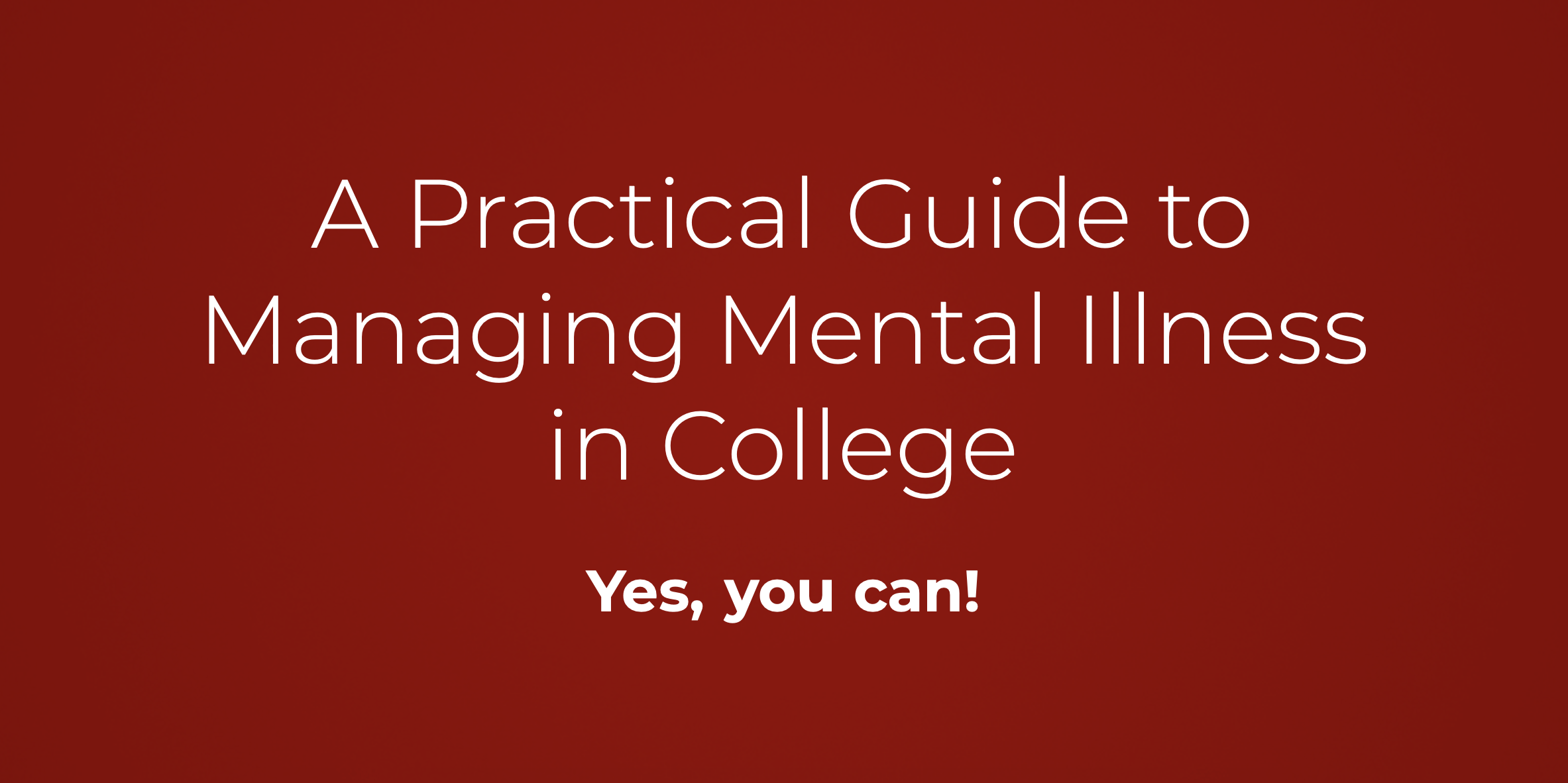A Practical Guide to Managing Mental Illness in College

Hi! My name is Lucie, I’m 21, a junior biology major, and I have anxiety and depression. Managing my mental health has been one of the biggest hurdles in my transition into adulthood. Here’s what I’ve learned so far.

Is therapy for me?
Seeing a therapist for the first time can be scary and daunting. You may feel like you aren’t “sick enough” to seek help, or you’re “too sick.” Therapy is for everyone! You deserve support no matter your stage in life. You can see someone for practically anything, and they will guide you to a level of care that is appropriate for your situation. Don’t worry- if you’re too scared to make that first call, your mom can do it for you ;)
Finding a therapist
Psychology Today has a great tool for locating therapists in your area, just search by zip code. (https://www.psychologytoday.com/us/therapists) Many offices can give your cost and insurance information over the phone, and may be able to offer a free consultation with the therapist, so you can get to know them before the first session.
Since the COVID-19 pandemic, teletherapy and online therapy have become even more popular and accessible. This can make it even easier to fit counseling into your schedule.
It may take more than a few sessions to get used to a new therapist. For my current therapist, we didn’t start making progress until I was seeing her for a few months. I had to develop a relationship with her before we could get into the good stuff. Give your therapist a fair chance; at the same time, don’t be afraid to “break up” with your therapist if you don’t feel like it’s a good fit. Trust yourself! If something doesn’t seem right, bring it up with your therapist and discuss ways to improve the environment. If you still aren’t vibing after a few more sessions, (politely) dump them and try again!
Navigating cost
If you are on a parent’s insurance plan, make sure you have a copy of the insurance card (sometimes a picture is enough), and know the policy holder’s date of birth. Often this is the only information you will need to access your mental health benefits. One phone call to your insurance company can give you a lot of information about what your cheapest options are, and which providers are covered by your plan.
If you don’t have insurance, your college may offer a set of free or discounted sessions that are included as part of your tuition. These programs can be more or less flexible depending on the university. For example, when my friend ran out of free sessions, the therapist at her college allowed her to keep coming weekly for a low co-pay. Your academic advisor will be able to give you information on your counseling options at school or recommendations for outside resources.
Medication?
Your primary care doctor or a psychiatrist (not the same as a therapist) can prescribe medication. Just like finding a therapist, it can take a few tries to find the right medication for you. Work closely with your doctor, don’t forget to refill your prescriptions, ask about generic and low-cost options, and never self-medicate or go “cold turkey.” When your medication or dosage are changing, you may need extra support. When appropriate, let your professors know ahead of time if you will need accommodations.
Self-help and self-care
Some extra preparation and thought can make your self-care sessions more intentional and effective. These habits take time to develop, and can feel awkward in the beginning. Set a specific time in your schedule to attend to your self-care, and treat it like an appointment or a class that you can’t miss! If you can’t think of anything to do, explore YouTube and your library for self-help and self-care practices. Breathing and mindfulness exercises are a great place to start.
Your pace is perfect
For me, my mental health is like a three credit class! So I take this into account when I’m arranging my work and school schedule for the semester. My ideal pace is a little slower than most students, but I know that my brain and my grades will thank me for taking things at my own pace!
Prepare for hard times ahead of time!
When you know a week or event is going to be particularly stressful, plan ahead to give yourself plenty of time and self-care for before and after. For example, I make my therapy visits a priority during final’s week, and give myself plenty of alone-time penciled in around holidays.
Talk to your university’s accessibility office
If you have a diagnosis of a mental illness or learning disability, make sure to bring documentation to your university’s accessibility office. This documentation is key to getting accommodations from your professors. Often it cannot be applied retroactively, so get it to them as soon as possible, even if you don’t think you need it right now.
What about emergencies?
If you or someone you know is in a mental health crisis, don’t hesitate to seek help immediately. Save emergency numbers into your phone so you can easily access them. You can access text (https://www.crisistextline.org/) and talk hotlines 24/7 (https://suicidepreventionlifeline.org/). And your area may even have a “warm line” for non-emergency mental health crises. (Find a warmline in your state: https://screening.mhanational.org/content/need-talk-someone-warmlines).
Don’t hesitate to call 911 or visit your nearest emergency room, even if it doesn’t feel like a true emergency. Your RAs, professors, and academic advisors can also be useful in a pinch.
Serious talk: you can do this
Yes, you. You have already made it so far, and done so many hard things. I’m so proud of you! You are capable of so much more than you know. Be kind to yourself, and keep communicating your needs. There will be ups and downs and days that kick your ass. But I promise, you can do this.
Keep in touch! Subscribe to the SSF Newsletter today for news and updates!
Have any questions you'd like to ask, requests for articles, or feedback? Email us at help@sebsscholarship.org.
Written by Lucie Sullivan on Sep 21, 2020